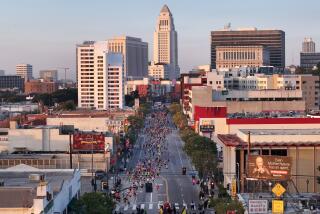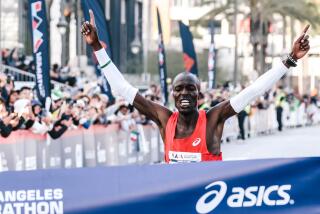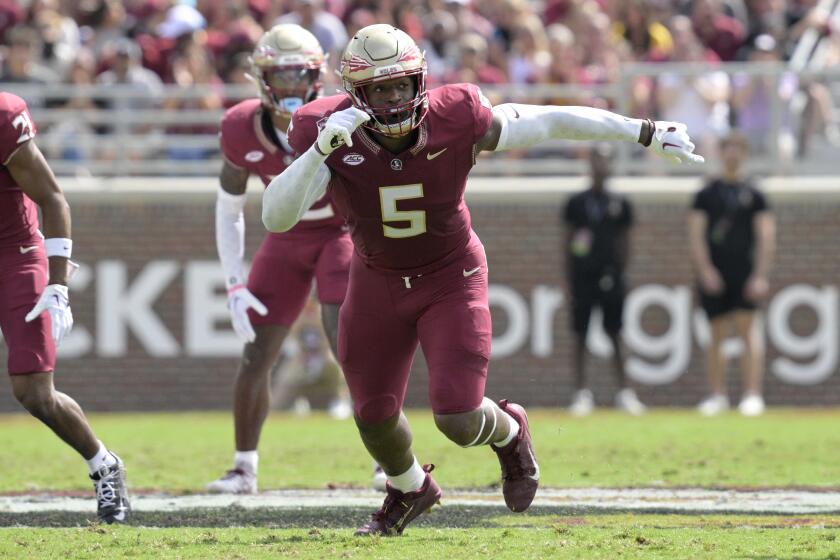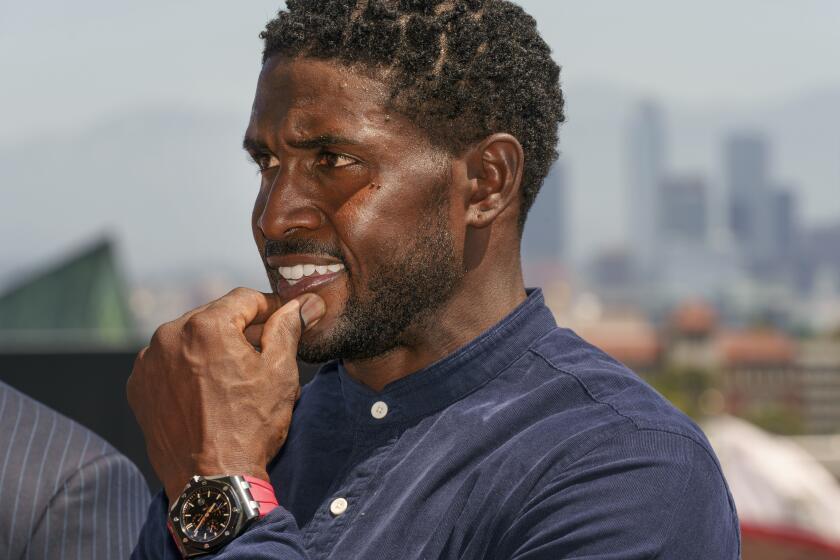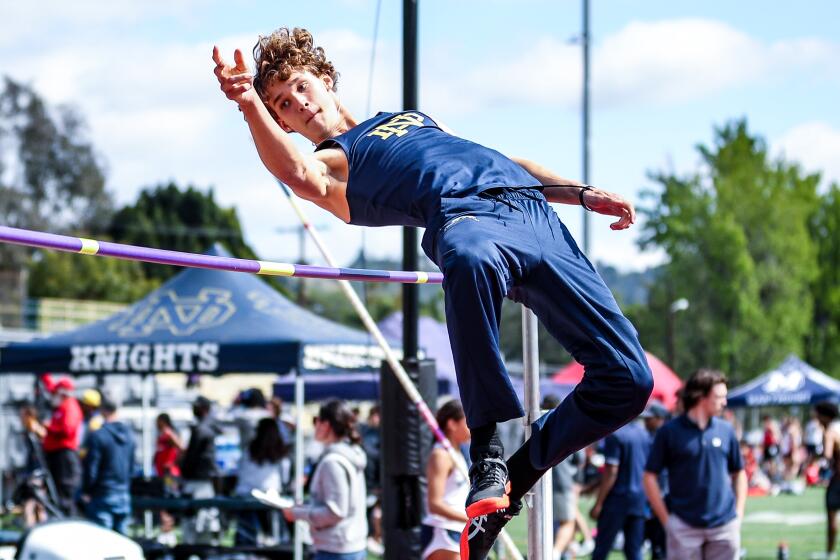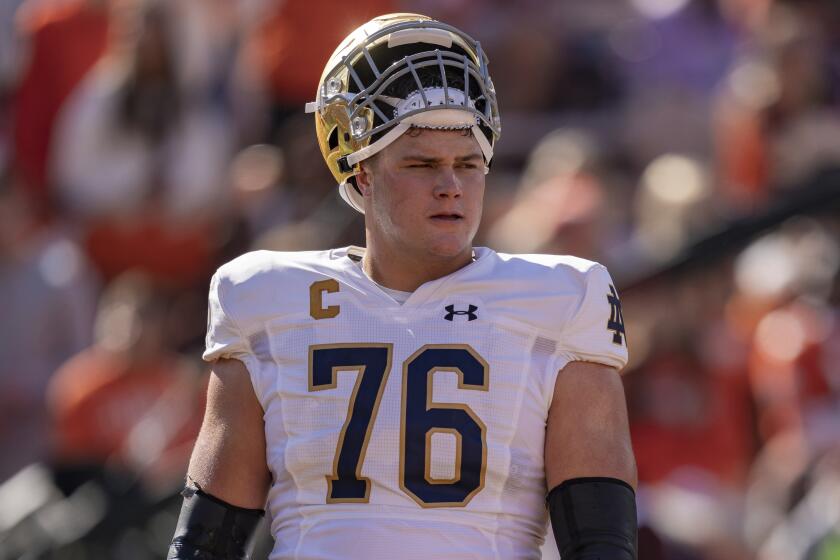Marathon weekend in L.A. to feature annual race and the U.S. Olympic trials
The last time Jared Ward ran in Southern California, he took a self-guided 26-mile jaunt past some of the area’s top attractions — Dodger Stadium, the Hollywood Walk of Fame and Rodeo Drive, among others.
Ward passed the landmarks quickly en route to a third-place finish in last spring’s Los Angeles Marathon, where he ran a personal-best 2 hours 12 minutes 56 seconds.
“That was kind of my opportunity to get a nice tour of L.A., not fighting the traffic. But I don’t notice much of the scenery when I’m racing,” said Ward who, as the first American to finish that race, also won a national championship in only his third marathon.
Ward is returning to L.A. for what’s being billed as “Marathon Week,” featuring the men’s and women’s U.S. Olympic trials on a downtown loop circuit Saturday and the 31st L.A. Marathon, on its stadium to the sea course, Sunday.
Ward will be among 375 or so elite runners — 200 women and 175 men — competing for six spots to Rio de Janeiro this summer. The men will start at 10:06 a.m., followed by the women 16 minutes later. Given the looped nature of the course, the two fields will undoubtedly merge before the halfway point.
Ward is hoping to again be going so fast that he doesn’t see the crowds and misses out on the local flavor.
“You get into the last few miles and you’re in it and you’re focused, then you start not seeing any of those things,” Ward said. “All you see is the guy in front of you and all you hear is your breathing and his.”
Tracey Russell, chief executive of Conqur Endurance Group, which is managing both races, said the idea of staging them on the same weekend was essentially an edict. In each of the last two Olympic cycles, USA Track and Field has required the city that won the bid for the trials to stage its community marathon on the same weekend as the elite race.
So when L.A. was selected to host the trials two years ago, it had to be decided whether to run the races in mid-March, when the L.A. Marathon is usually run, or move the community race up, giving the trials qualifiers an extra five weeks to recover before the Olympics.
It was quickly decided that the community race was the one to move up but there were challenges. The L.A. Marathon, which draws a field of more than 25,000, runs through four cities, each of which had to sign off on a new date. But even with approval the course, a jet-quick downhill layout from Dodger Stadium to the Pacific Ocean, was quickly discarded for the trials.
Organizers needed a fairer, flatter course to sort out the Olympic qualifiers, so they designed one that will begin and end at Gil Lindsay Plaza outside of the Staples Center and Convention Center area, looping four times through the USC campus and the Coliseum. It may not replicate the Olympic layout — officials in Rio have not released a description of their route yet — but it is similar to the four-loop course used four years ago in London.
Russell said the course features a little something for everyone: a series of tight turns for the strength runners, a long straightaway down Figueroa Street for the rhythm runners and a compact footprint, which is appealing to fans and the folks at NBC, which will broadcast the race live.
“If you’re a spectator and you’re standing on Figueroa, you’re going to see the athletes eight times,” she said. “We are creating a course that’s inspirational and also spectator friendly and broadcast friendly.”
With 85-plus turns, what it won’t be is fast; Russell said runners have told her they expect the women’s race to be won in about 2:25 and the men’s in 2:10.
Sunday’s point-to-point race, which starts with the wheelchair athletes at 6:30 a.m., followed by the seeded women at 6:45 and the rest of the field at 6:55, may not be much quicker since fewer elite runners have entered, choosing to prepare for the Olympic marathon instead.
Ward suggests the Sunday runners shouldn’t be in such a hurry anyway, and not because temperatures could reach into the 80s.
“The L.A. Marathon does a fantastic job taking marathoners on a tour of the city,” he said. “Who wouldn’t want a tour of Los Angeles? Through Hollywood, finishing on the beach.
“That’s an incredible opportunity, even for people who live in L.A.”
More to Read
Get our high school sports newsletter
Prep Rally is devoted to the SoCal high school sports experience, bringing you scores, stories and a behind-the-scenes look at what makes prep sports so popular.
You may occasionally receive promotional content from the Los Angeles Times.


